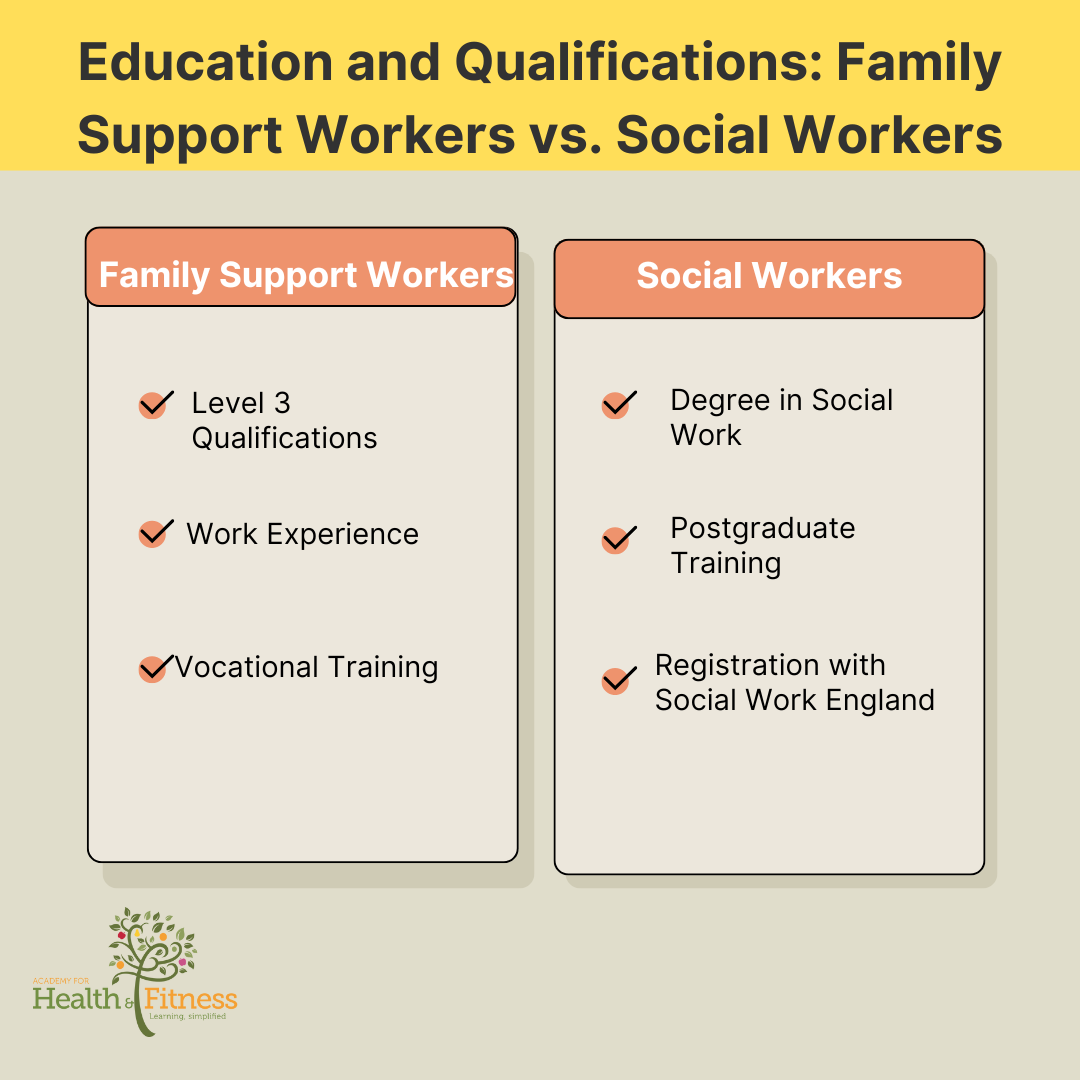Are family support workers the same as social workers, or do their roles diverge in ways that matter? In the UK, both professions play a vital role in the social services landscape, offering life-changing support to vulnerable individuals and families. However, while their goals often align, the paths they take to help people are quite distinct.
If you’re exploring a career in social care, or simply curious about the differences, understanding the unique responsibilities, qualifications, and impact of family support workers versus social workers is essential. Let’s uncover how these two roles compare and discover which may be the right fit for you.
What is a Family Support Worker?
A Family Support Worker is a professional who provides practical and emotional support to families experiencing difficulties, with the aim of helping them improve their overall well-being and stability. They work alongside social services and other agencies to offer early intervention, assisting families before issues escalate to more severe levels. Unlike social workers, family support workers do not have statutory duties but instead focus on offering guidance, resources, and personalised assistance tailored to each family’s needs.
What is a Social Worker?
A Social Worker is a professionally trained individual who plays a crucial role within the broader UK social services system. Their primary responsibility is to support vulnerable individuals and families, ensuring they receive the appropriate care and safeguarding they need to improve their well-being and quality of life. Social workers operate within a legal framework and are bound by statutory duties that give them significant authority in making decisions that can impact people’s lives.
Types of Cases Managed by Social Workers
Social workers manage a wide variety of cases, including:
Child Protection:
Social workers ensure the safety of children in vulnerable situations, assessing cases of neglect or abuse, and deciding whether a child should remain with their family or be placed in care.
Elderly Care:
They assist older adults who need support due to health conditions, mobility issues, or a lack of family support, ensuring they have access to necessary resources, such as care homes or home assistance.
Mental Health:
Social workers help individuals struggling with mental health issues by connecting them to the appropriate healthcare services and providing emotional and practical support. They also advocate for individuals’ rights in care plans and treatment options.
Statutory Duties and Legal Framework
Social workers operate under statutory duties, meaning they have legal authority and responsibility to intervene in people’s lives when necessary. They work within a range of legal frameworks, including:
Children’s Act (1989, 2004):
This legislation requires social workers to act in the best interests of children, ensuring their safety, welfare, and development. They are responsible for investigating concerns about child abuse or neglect and taking legal action to protect children.
Mental Capacity Act (2005):
Social workers assess whether individuals have the capacity to make decisions about their care and well-being. If a person lacks capacity, social workers ensure decisions are made in the individual’s best interests.
Care Act (2014):
This law outlines the duties of local authorities to provide care and support to adults in need, particularly those with disabilities or age-related issues. Social workers are involved in assessing individuals’ needs and ensuring they receive appropriate care.
Social workers must be registered with Social Work England and adhere to ethical guidelines that prioritise the dignity, rights, and welfare of their clients. They collaborate with professionals like healthcare workers and the police to ensure comprehensive support for vulnerable individuals.
Education and Qualifications: What’s Required?

When comparing the educational requirements for family support workers and social workers, there are notable differences, reflecting the varied responsibilities and statutory duties each role holds. Here’s a breakdown of the academic qualifications for both professions:
Family Support Workers: Level 3 Qualifications, Work Experience, and Vocational Training
To become a family support worker, individuals typically need:
Level 3 Qualifications:
These could include qualifications such as NVQ Level 3 in Health and Social Care, Childcare, or related fields. These qualifications are designed to equip workers with practical knowledge and skills to support families effectively.
Work Experience:
Practical experience in working with families, children, or vulnerable adults is essential. Many family support workers gain experience through volunteer roles or positions in social care, youth work, or educational settings.
Vocational Training:
Family support workers often benefit from additional vocational training in areas such as child protection, safeguarding, and family dynamics. Training programs are tailored to provide hands-on skills that can be applied directly in their day-to-day work with families.
While family support workers don’t need a degree, a solid background in community work, social care, or youth work is highly valued, along with continued professional development (CPD) to enhance their skills.
Social Workers: Degree in Social Work, Postgraduate Training, and Registration with Social Work England
In contrast, social workers must meet stricter academic and professional requirements due to the statutory nature of their role. To become a qualified social worker, individuals must have:
Degree in Social Work:
A Bachelor’s degree in social work (BSW) or a Master’s in social work (MSW) is mandatory. These programs, offered at UK universities, cover essential topics like human development, social justice, law, and ethics, preparing social workers for their statutory responsibilities.
Postgraduate Training:
Many social workers opt for postgraduate study, either to specialise in areas like mental health, children and families, or to progress into advanced practice roles. Master’s programs also allow individuals with unrelated undergraduate degrees to transition into social work.
Registration with Social Work England:
All practising social workers in the UK must be registered with Social Work England, the regulatory body that ensures social workers meet ethical and professional standards. To maintain their registration, social workers are required to complete regular Continuing Professional Development (CPD).
Day-to-Day Responsibilities: Key Differences and Similarities
Key Differences:
Authority:
Social workers have statutory powers, allowing them to make legal decisions such as removing children from homes or placing individuals in care. Family support workers do not have this authority.
Focus:
Family support workers focus on prevention and early intervention, offering guidance before legal action is necessary. Social workers focus on cases where legal and safeguarding actions are required due to immediate risks.
Type of Support:
Family support workers provide practical and emotional support, while social workers manage legal cases and safeguard vulnerable individuals through statutory processes.
Similarities:
- Both professionals work closely with vulnerable families, children, and adults.
- Both roles require collaboration with other services and professionals, such as healthcare providers, schools, and housing authorities.
- Both aim to improve the well-being and safety of individuals, though they approach this from different angles (practical vs. statutory).
Work Settings and Clients
Key Differences in Work Settings:
- Family Support Workers are more likely to work in community-based settings and within homes, providing hands-on support directly to families.
- Social Workers operate in more formal environments, such as local authorities, hospitals, and legal settings, handling statutory cases and making legal decisions.
Shared Client Demographics:
Both family support workers and social workers assist vulnerable children, families, and adults, though the scope of their work and the type of intervention differ significantly based on their statutory duties and the level of risk involved.
Employment and Salary Comparison
- Family Support Workers typically earn between £20,000 and £28,000 annually, depending on experience and location. Entry-level positions often start at the lower end of this range, while more experienced workers can earn towards the upper limit.
- Social Workers tend to earn more, with salaries ranging from £30,000 to £40,000. Newly qualified social workers typically start around £30,000, with more experienced professionals or those in senior roles earning up to £45,000 or more.
How to Transition from Family Support Worker to Social Worker
For family support workers looking to transition into a social worker role, the path involves gaining additional qualifications and meeting specific regulatory requirements. Here’s a step-by-step guide:
1. Obtain a Degree in Social Work
The primary requirement to become a social worker in the UK is a degree in social work. This can be pursued through:
- Undergraduate Social Work Degree (BA or BSc): A 3-year full-time program that provides the necessary academic and practical skills for the role.
- Postgraduate Social Work Degree (MA or MSc): If you already hold a degree in a related field (e.g., psychology, sociology), you can enrol in a 2-year master’s program in social work.
2. Relevant Work Experience
Your experience as a family support worker will be invaluable, as it provides you with hands-on knowledge of working with vulnerable families and children. This practical experience is highly regarded in social work, and many degree programs include placements where you can apply your skills in social care settings. Highlighting your experience with early intervention, case management, and collaboration with social services will strengthen your application for social work training.
3. Registration with Social Work England
After completing your degree, you must register with Social Work England, the regulatory body for social workers in the UK. This registration is essential for practising as a professional social worker.
4. Continuous Professional Development (CPD)
Even after qualifying, social workers are required to engage in Continuous Professional Development (CPD). This includes additional training in specialised areas like child protection, mental health, or adult safeguarding.
FAQs
1. What is family work in social work?
Family work in social work involves supporting families to resolve issues such as domestic challenges, parenting difficulties, and relationship conflicts. Social workers focus on assessing and addressing the needs of the family, safeguarding children, and providing access to services that improve the family’s overall well-being.
2. Who is a social worker in the UK?
A social worker in the UK is a trained professional who supports vulnerable individuals, including children, families, and adults, by ensuring their safety, health, and welfare. Social workers are legally bound to safeguard at-risk individuals and must be registered with Social Work England, the regulatory body for social workers.
3. What is the job description of a support worker?
A support worker provides practical and emotional support to individuals facing challenges due to disabilities, mental health issues, or vulnerable situations. Their tasks include assisting with daily activities, promoting independence, and connecting individuals with community resources. Support workers play a key role in improving the quality of life for the people they assist.
4. Is a social worker a service worker?
Yes, a social worker is a service worker within the broader category of social services. They provide essential services related to safeguarding, crisis management, and legal intervention to support vulnerable individuals and families in society. However, unlike general service workers, social workers have statutory duties and legal authority.
Final Words
No, a family support worker is not the same as a social worker. While both roles play essential parts in the social services system, their responsibilities and legal authority differ significantly. Family support workers focus on early intervention, providing practical and emotional support to families without statutory powers. In contrast, social workers manage statutory cases, have legal authority, and handle safeguarding duties such as child protection or crisis intervention. Both roles, however, are crucial in supporting vulnerable families and individuals.




















